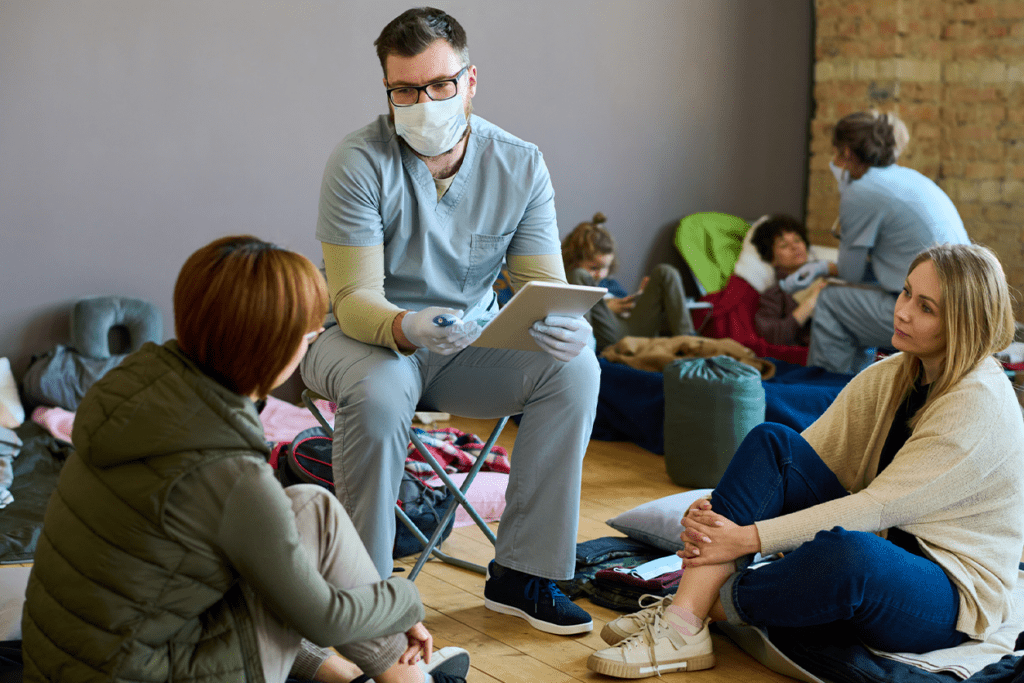
Primary.Health community clinics and new federal reimbursement for ‘street medicine’ make it easier to provide healthcare to the unsheltered.
On any given night, more than half a million people in the United States experience homelessness, according to a 2022 U.S. Department of Housing and Urban Development (HUD) estimate.
Over time, homelessness can result in declines in physical and mental health, the Centers for Disease Control and Prevention (CDC) note. Additionally, unhoused persons experience high rates of health issues such as HIV infection, alcohol and drug abuse, mental illness, tuberculosis, and other conditions.
And in a sobering new UC San Francisco study, unhoused people living in that city are 16 times more likely to die suddenly than their fellow residents who are housed.
Reimbursement for ‘Street Medicine’
Providing medical care for the unhoused is a costly logistical challenge for affected communities. For their part, housing-insecure individuals face numerous barriers to accessing healthcare, such as financial constraints, lack of identification, transportation challenges, and stigma.
There’s some relief on the horizon, however. Recently, the Centers for Medicare and Medicaid (CMS) agreed to reimburse doctors, nurses, and other providers for treating unsheltered homeless people wherever they are, rather than just in hospitals or clinics.
The new CMS Place of Service (POS) code set defines an Outreach Site/Street as “a non-permanent location on the street or found environment where health professionals provide preventive, screening, diagnostic, and/or treatment services to unsheltered homeless individuals.”
While this is a boon for street medicine, the current number of such programs remains low, operating in roughly just 140 cities in 27 countries across six continents, according to the Street Medicine Institute. Consequently, communities require additional solutions for treating the vulnerable unhoused in their jurisdictions.
Community health collaborations – no office required
Enter Primary.Health’s ‘community clinics’ solution. Our novel tech-powered approach offers multiple modes for communities to provide accessible testing, vaccinations, and treatment for health conditions common to the unhoused:
- Vending machines: 24/7 dispensing of no-cost essential and emergency health items and services, like self-testing kits and harm reduction supplies, installed at transportation hubs and other high-traffic areas;
- Pop-up clinics: Fast, accessible diagnostic testing and vaccination clinics set up at community hubs, churches, or wherever needed;
- Self-testing kits: On-site, online, or at-home distribution of self-testing kits for infectious diseases, sexually transmitted infections (STIs), preventive screenings, and more;
- Mobile clinics: Testing, vaccinations, and preventive services ‘on wheels’ that deliver care to shelters, community hubs, or during public health emergencies;
- Virtual care: Test-to-treatment links for virtual consults, especially critical for the unhoused. A recent USC Price study found that 94 percent of unsheltered people have a cell phone, making this technology a vital way to educate and treat people experiencing homelessness.
The Primary.Health commitment
We work closely with our community partners to determine the most appropriate clinic model(s) for bridging healthcare access gaps in the populations they serve.
Every Primary community clinic option is powered by our community health software platform. So whether your community delivers STI test kits to residents of shelters or installs a vending machine stocked with diagnostics downtown, you’ll benefit from all platform features. These include digital registration, scheduling, digital consents, recording and reporting of test results, data analytics, links to treatment options, and much more. Outreach and clinical staff on the ground can even navigate the user-friendly platform on behalf of patients lacking technological skills or experiencing other barriers to using the software.
Learn more about Primary’s community clinic solutions for the unhoused and other vulnerable populations.
